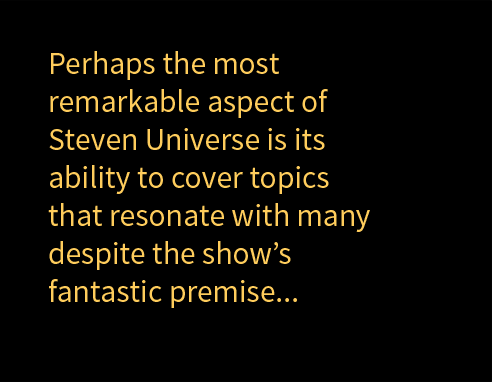|
|
Perhaps the most remarkable aspect of Steven Universe is its ability to cover topics that resonate with many despite the show’s fantastic premise: a group of aliens based on gemstones travel to Earth and go to war with their own kind to protect the planet before the leader of these rebels, Rose Quartz, gives birth to a human/gem hybrid named Steven, giving up her physical form and leaving only her gem embedded within him. This show’s appeal primarily stems from its social progressivism, featuring several openly LGBT+ relationships and non-binary characters as well as other political and social commentary, in the form of a space opera targeted toward children. The show’s last few episodes, particularly the series finale “Change Your Mind,” thus appear primarily as an extended metaphor for a trans child coming out to bigoted parents.“Change Your Mind” features the final confrontation between the heroic Steven and White Diamond, one of the show’s three main antagonists. White Diamond leads the Great Diamond Authority, also consisting of the emotional Blue Diamond, the militant Yellow Diamond, and formerly the childish Pink Diamond, who Steven learns toward the end of the series is his mother’s true identity. Steven Universe features heavily pacifist themes, so when he learns that he was once Pink Diamond, he realizes that if the Diamonds will listen to him, he can stop the main conflict without further fighting. Steven is his own person, but the other Diamonds repeatedly refer to him as Pink and treat him as they treated her, establishing the premise of seeking acceptance and understanding moving into the final episode. All three Diamonds are caught in their older ways. They believe Steven is still just Pink, playing some strange game, but as Steven talks with them, they make attempts to improve. Blue doesn’t fully understand that Steven is his own person, but she is the first to defend him to Yellow, saying, “She prefers to be called Steven” when Yellow asks why she has started helping him instead of listening to White. Blue’s acceptance of Steven despite her own lack of understanding provides assistance in his plight to confront White and convinces Yellow to come around quickly. However, if Blue and Yellow play the part of supportive aunts, White is instead the bigoted mother who understands Steven’s predicament and still refuses to accept him for who he is. Because she is stationed within the head portion of a gargantuan spaceship made up of limbs from the other Diamonds’ vessels, White sees roughly seven minutes of screen time, but she uses almost all of it referring to Steven exclusively as Pink, treating his new identity as a game, and ultimately gaslighting him. White believes herself to be the only flawless being in the universe, and she purges the other gems she comes into contact with of their flaws by turning them into mindless puppets mimicking her every action. White believes only in her bigoted, preconceived notions, doubling down on these thoughts when challenged. When Steven refers to Pink as a separate entity amid White’s attempts to gaslight him into believing he truly is Pink, White and her possessed gems surround him and laugh, emphasizing his isolation and causing him to wonder if she’s right and if his identity as Steven truly is nothing more than a game. White justifies this by telling him, “You can hide from yourself, but you can’t hide from me.” To White, Pink is so deluded that even she believes she’s become someone else. White then decides to prove that Steven is and has always been Pink biologically by tearing out his gem so that it may take on its true form. It briefly shows the images of both Pink Diamond and Rose Quartz before settling on Steven, confirming that while he may have once been different, this is who he truly is now. White refuses to believe this, asking where Pink is and, in attempting to possess him just as she did the other gems, tells him, “I only want you to be yourself.” In the episode’s denouement, now that White has been disproven and seen that even biologically, Steven is Steven, she breaks down in front of him, saying, “You do not look like this, you do not sound like this.” Only when White’s made to understand how petulant and childish she’s acting does she understand her own flaws and start to see that reality may not be how she once perceived it. She panics, asking Steven who he is if he’s not Pink despite his repeated insistence that he’s Steven throughout the episode because her entire worldview, once reliant on her bigotry, has collapsed. Steven promises to help her learn and understand the nature of society at large, which she hasn’t participated in for millennia, after she’ll “leave [her] own head.” White has spent so long within her head, physically and metaphorically, that her the world she believes exists is all she’s known, and for all Steven’s done already, she will have to take the first step herself to stop being close-minded and truly connect with others. While this story succeeds on its own merits, it also reinforces a major theme of the show. One of its most prominent messages, to “let yourself be whoever you are,” initially appears in the first season and recurs until Steven recites it verbatim to White. Steven lives by these words, taking pride in genderbending elements such as crossdressing repeatedly and fusing with other people and gems into non-binary identities, but the older gems, taking after the Diamonds, refuse to understand this and cannot join his side until they change their minds. One prominent antagonist, Jasper, calls Steven sick when she first realizes what he is; Bismuth, an old acquaintance of Rose’s, disbelieves that Steven is his own person and not Rose until shortly before “Change Your Mind;” and Steven even believes he is Rose for a time following the turmoil these characters have lain on him, suffering through this identity crisis until he finally comes to terms with himself before White Diamond. Thus, now that Steven has made peace with his identity – he is Steven and always has been, he proclaims – the show can end. This series, in part a tribute to Broadway musicals, finishes with a song. While there is an emotional reprise of the main theme as the main conflict is resolved, a different tune concludes the series. Steven understands that not everyone he meets will come to their senses and accept him as White has, but he knows now that they don’t need to. The series’ final song, also titled “Change Your Mind,” has Steven sing, “I don’t need you to respect me, I respect me. I don’t need you to love me, I love me. But I want you to know you could know me if you change your mind.” He’s decided that he doesn’t need affirmation from others, only himself, but if those others were more open-minded, they could still have a positive relationship. All Steven – and the showrunners – can hope is that those with parents and other relatives like White Diamond will understand that a lack of affirmation doesn’t make them any less of a person and that they are powerful on their own. |
|
William Faour is an avid reader and alleged writer who believes anything can be analyzed and picked apart regardless of literary merit. Not a critic by any means, he enjoys searching for whichever deeper meanings he can gleam whenever obsessing over a new work, although he’s recently preferred examining themes of gender norms. Faour’s work has previously appeared in Texas’ Best Emerging Poets, Glass Mountain, and Shards. He plans to graduate from the University of Houston this month with B.A.s in English and Political Science. In the meantime, you can find him social distancing at home with his pets. |
|


